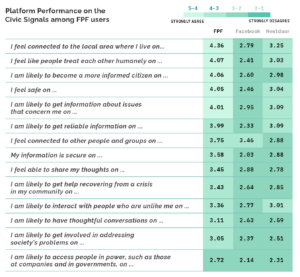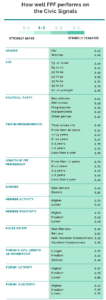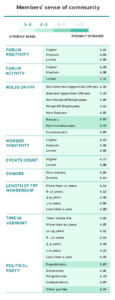
SUMMARY
Public-friendly digital spaces where people feel welcome, make connections, build understanding, and work together can seem elusive. This work builds on our Civic Signals, a collaboration between the Center for Media Engagement and New_ Public. We found that, with few exceptions, many popular platforms did not live up to the ideals of public-friendly digital space in the eyes of their users.
In this report, generously supported by The John S. and James L. Knight Foundation, Omidyar Network, and Robert Wood Johnson Foundation, we investigate how members of Vermont’s Front Porch Forum perceive the platform.
Front Porch Forum is a network of town-specific, proactively moderated online forums that help neighbors connect with each other to buy and sell goods, offer and request help and recommendations, and discuss local issues.
For this project, New_ Public funded the Center for Media Engagement (CME) to design, implement, and analyze an online survey of Front Porch Forum (FPF) members.
CME collaborated with FPF to create and send a survey to FPF members in February of 2023. Members were asked about their experience on the platform and how it compares to other platforms, in addition to questions about their backgrounds.
KEY FINDINGS
- Perceptions of Front Porch Forum (FPF) were generally positive.
- FPF users rated the platform as performing better on the 14 Civic Signals than Facebook and Nextdoor. For instance, 81% of respondents felt they could become a more informed citizen on FPF, while 26% said the same about Facebook and 32% about Nextdoor.
- People who were more engaged with FPF rated the platform more favorably, including people who were more active on their forum and who donated to FPF.
- FPF was a more valuable resource to people who were newer to their neighborhoods.
- Although those with all kinds of political views rated FPF positively on average, Democrats and Progressives had more favorable evaluations of FPF than Republicans.
- Members of forums that were more established, meaning the forum had a higher average length of membership, rated FPF more positively.
- Members who behaved with more positivity on FPF tended to have a better experience on FPF and to have a stronger sense of community. Yet communities with more positivity on average tended to be evaluated less favorably.
INTRODUCTION
This research, a collaboration between the Center for Media Engagement (CME) and New_ Public, looks to advance the idea of public-friendly digital design.
CME collaborated with Front Porch Forum (FPF) to field an online survey of FPF members in February 2023. Front Porch Forum describes itself as:
“A Vermont Public Benefit Corporation whose mission is to help neighbors connect and build community. [They] do so by hosting a network of community-specific online forums that serve every town in Vermont (as well as a handful of towns in portions of New York and Massachusetts).
Anyone can join the Forum where they live or work. Members post about any topic of interest to their neighbors: items for sale, recommendations, assistance, events, discussion, or the like.
Postings are reviewed by FPF’s staff of professional online community managers before publication to assure compliance with FPF’s Terms of Use and to keep each Forum mostly civil and constructive.”
FPF is a small family-owned Vermont public benefit corporation that is driven by its values:
- FPF is not in the surveillance business. They don’t profile their members or sell their data.
- FPF’s team of Vermont-based moderators review all content before publication.
- FPF does not fuel screen addiction; it’s meant to be a starting point for real-world engagement with neighbors.
- FPF has over 235,000 active members.1
- For this survey, 13,473 filled out portions and 11,465 completed it.2
Civic Signals across Platforms
Previous work from New_ Public and the Center for Media Engagement called Civic Signals: The Qualities of Flourishing Digital Spaces identified principles of healthy, publicly-oriented platform design, such as “access to reliable and relevant information about community issues” and “the opportunity to connect meaningfully with others.” We examined how FPF members perceived FPF’s performance on these signals compared to those same members’ impressions of Facebook’s and Nextdoor’s performance.
Survey respondents were asked to think in general about their experience on FPF, Facebook, and Nextdoor. We then asked them to indicate how strongly they agreed or disagreed with Civic Signals statements. Only those who used each platform were asked to make these assessments.3
Among those using FPF, FPF was perceived as performing better on the Civic Signals than Facebook and Nextdoor.

Front Porch Forum Perceptions, Engagement, and Influence
Many FPF members engage with the content and hold positive perceptions of the platform.
- 63.0% of respondents reported that they open and look at every issue (each issue contains postings that have been submitted by forum members and moderated by FPF). An additional 27.2% of respondents reported that they open and look at their forum issues often. Members receive issues between once a week and three times a day, depending on how much content the members of a given Forum generate.
- When respondents were asked how useful FPF was to them (and their families, if applicable), nearly half of respondents (48.3%) reported that they found the platform very useful and another 44.9% found it somewhat useful. Only 6.8% found it to be not too useful or not at all useful.
- The majority of respondents (69.5%) reported that they found the platform very valuable for their community, and another 27.4% found it somewhat valuable. Only 3.1% found it to be not too valuable or not at all valuable.
We asked respondents if they had become more informed about seven aspects of their communities as a result of being a FPF member. Respondents could select more than one answer. FPF members became more informed about:
- 81.0% – Neighborhood/town community issues
- 65.7% – Local contractors (e.g., plumbers)
- 60.8% – Opportunities to be more engaged in your neighborhood/town
- 59.0% – Your neighbors’ perspectives on local issues
- 46.6% – Local clubs and organizations
- 43.0% – Local government services
- 40.8% – Local shops
We then asked respondents if, in the past year or so, they had taken any of ten different actions in response to seeing something on their forums. Respondents could select more than one answer. FPF members took these actions based on what they saw on their forum:
- 60.6% – Attended a local event or public meeting
- 53.2% – Discussed local issues with a neighbor
- 51.1% – Bought something from a local business
- 25.3% – Let a neighbor borrow something
- 21.0% – Volunteered locally
- 19.2% – Cooperated on a shared community need e.g. cleaning up public green space or rebuilding a playground
- 18.3% – Contacted a local public official
- 14.6% – Got involved in a local political campaign or grassroots effort to improve my community
- 11.7% – Worked with a neighbor on a small project (fixing a computer, stacking wood, etc.)
- 11.2% – Visited with someone in my neighborhood/town
Survey respondents generally believed that their neighborhood or town was a good place to live. Respondents were asked on a scale from one (meaning very bad) to five (meaning very good) to evaluate their neighborhood/town. About half of respondents (50.2%) rated their neighborhood/ town a five out of five, meaning it’s a very good place to live, and another 37.0% of respondents rated their neighborhood/ town a four, 10.5% of respondents rated their neighborhood/town a three, 2.0% of respondents rated their neighborhood/ town a two, and 0.3% of respondents rated their neighborhood/town a one.
Respondents were then asked the extent to which they agreed or disagreed with nine statements about their neighborhood/town (e.g., “I know most of my neighbors personally”). On average, people had a close connection to others in their neighborhood, reporting an average response of four on a scale from one to five, with five indicating more connection.
Predicting What People Think about Front Porch Forum and Their Neighborhood
We investigated whether 26 member or forum attributes predicted five outcomes. (For a detailed description of each member and forum attribute, see the method section at the end of this report). These data were anonymized, meaning that any information that could identify individual members was not available to the researchers.
The five outcomes we analyzed were:
- How favorably the survey respondents rated Front Porch Forum on the Civic Signals.
- How personally useful they found FPF to be.
- The number of topics on which they felt more informed due to their FPF membership ( 0 – 7 ).
- The number of communityoriented actions they had taken because of FPF, such as volunteering or connecting with a neighbor ( 0 – 10 ).
- The strength of their sense of community in their neighborhood.
We examined whether these five outcomes were predicted by 26 attributes, grouped into three categories:
- Member characteristics (such as age or gender)
- Member behaviors on FPF (such as whether they donate to FPF or participate on FPF as a business owner)
- Forum-level characteristics (such as how active or positive the forum a member belongs to is)
We summarize the findings below.
We first share broad takeaways and then examine the results for each outcome in more detail. Across all demographic groups, average impressions of FPF were above the measure’s midpoint. There was some variation, however, based on member demographics, forum use, and the characteristics of the forum.
Member Characteristics
Women tended to have more positive perceptions of FPF than men. Younger people tended to find FPF more useful than older people. In general, Democrats and Progressives held more favorable attitudes toward FPF than did Republicans. Democrats and Progressives also reported feeling more connected to their neighborhoods than did Republicans. Those with all political views rated FPF and their neighborhood positively on average. We note that these differences, while statistically significant, are often very small.
People who were newer to their neighborhood also reported benefiting from FPF more than those who had lived in their community for a longer period. This may indicate that FPF is a particularly valuable resource to those who are settling into a new place.
Member’s Forum Use
Members who submitted more positive postings tended to have better experiences on the platform. For instance, they felt more informed and reported being more civically engaged because of FPF.
More engaged FPF members found the platform more useful. People who donated to FPF and who were more active in general on the platform rated FPF more positively, felt more informed, and were more active in their community because of FPF.
Members were asked to identify their roles on FPF, such as homeowner, renter, elected official, nonprofit employee, etc. For the most part, people felt similarly about FPF regardless of what roles they selected. People in many of these roles did, however, find FPF more useful than those who did not participate in these roles. and took more community-oriented actions because of FPF.
Forum Characteristics
Members of forums that were more established, meaning the forum had longer average membership, tended to perceive FPF as a more valuable resource. Members of more active forums and members of forums where the postings were more positive rated FPF less favorably, though the latter tended to have stronger connections to their community. This suggests that high levels of activity and positivity in digital communities may not maximize people’s evaluations
Predicting Civic Signals
We looked at how people rated FPF on the Civic Signals based on their characteristics, their use of FPF, and the attributes of the forum they accessed. We averaged people’s evaluations of FPF across the Civic Signals; higher values indicate more favorable perceptions.
As can be seen in the chart, all demographic groups rated FPF between “Neither agree nor disagree” and “Somewhat agree” on the measure asking them to rate FPF on the Civic Signals. There was some variation, however, in responses by member characteristics (such as level of member activity) and by forum attributes (such as average length of forum membership).
Member Characteristics
- Women rated FPF more favorably than men.
- Younger people rated FPF more favorably than older people.
- Democrats and Progressives rated FPF more favorably than Independents, Republicans, and those identifying with other parties.
- People who are newer to their neighborhood evaluated FPF more favorably than those who spent more time in their neighborhood.

Member’s Forum Use
- The longer they had been a member of FPF, the more favorably they rated FPF.
- Those who donated evaluated FPF more favorably than those who did not.
- The more active and positive people were on the platform, the more favorably they evaluated the platform.
- People who use FPF as renters and vacation homeowners rated FPF more favorably than those who did not utilize FPF in these roles.
Forum Characteristics
- Members of forums that were more established, or had a higher average length of membership, rated their forum more favorably on the Civic Signals.
- Members of forums that were more active and more positive rated FPF less favorably.
- These findings are depicted in the preceding chart, which shows people’s predicted evaluations of FPF’s performance based on member characteristics, forum use, and the characteristics of the forum. The averages control for other variables, meaning, for example, that the differences between men and women take into account the member’s age, partisanship, time in neighborhood, etc.
Predicting FPF as Useful
We next looked at which member and forum attributes predicted how personally useful people found FPF to be.
Member Characteristics
- Women found the forum more personally useful than men.
- Older people rated the platform as less useful than those who are younger.
- Democrats and Progressives found FPF more useful than Independents, Republicans, and those who belong to other parties.
- People who are newer to their neighborhood and to Vermont found FPF more useful than people who have lived in their neighborhood for longer.
Member’s Forum Use
- Donors, those who are more active on FPF, and those who have been members longer evaluated FPF as more personally useful.
- Members whose postings were more positive found FPF more useful.
- Members who engaged on FPF as business owners or nonprofit employees found FPF more useful than those who don’t use FPF for those purposes.
Forum Characteristics
- Members of forums that were more established, meaning the forum had a higher average length of membership, found FPF more useful.
- People who are members of forums with higher average levels of positivity and lower TOU (terms of use) violation rates viewed FPF as less personally useful.
Predicting FPF as Informative and Engaging
We wanted to understand what information people gained from FPF and what civic actions they took as a result of using FPF. We examined what predicted the number of local topics about which people felt they were more informed as a result of being a FPF member (out of seven) and the number of community-oriented actions people took because of something they saw on FPF (out of 10). In most cases, the same characteristics predicted both.
Member Characteristics
- Democrats and Progressives felt that their FPF experiences made them better informed about a greater number of issues and led them to take more civic actions than did Republicans.
- People who have lived in Vermont for a longer period of time cited fewer topics they felt like they had become more informed about through FPF and took fewer FPF-inspired actions in their community.
Member’s Forum Use
- People who had been on the platform longer, were more active on FPF, and had more positive postings indicated they had learned about more topics and were more civically engaged because of FPF.
- Donors, homeowners, and vacation homeowners felt better informed about a greater number of local topics and engaged in more civic activities because of FPF.
Forum Characteristics
- Members of forums that had a higher average membership length felt better informed about a greater number of topics and engaged in more civic actions because of FPF.
- Members of forums with higher average positivity felt informed about fewer topics and took fewer civic actions due to FPF.
There were a few member or forum characteristics that impacted only one of the two outcomes (either how informed or how civically engaged a member was because of FPF, but not both). These included:
Number of topics people felt more informed about because of FPF:
- Older people and people who had lived in their neighborhood for a longer period of time found FPF less informative.
- Business employees learned more from FPF than people who did not use FPF for this role.
- Members of forums that were more active felt that FPF informed them about a greater number of issues.
Number of community actions people participated in because of FPF:
- Progressives took more community actions as a result of FPF than did Democrats.
- People who participated on FPF as renters, business owners, nonprofit employees, and elected officials were inspired by FPF to take a greater number of civic actions.
- Members of forums with a higher percentage of TOU (terms of use) violations reported taking more civic actions as a result of FPF.
Sense of Community
Finally, we examined what predicted how strongly people felt the sense of community was in their neighborhood/town. In general, participants felt connected to their community, but there were some small differences.
Member Characteristics
- Democrats and Progressives felt a greater sense of community in their neighborhood than Republicans and members of other parties.
- Those who had lived in Vermont for a longer period of time felt less connected to their neighbors.
Member’s Forum Use
- Members who had been part of FPF for a longer period of time, donated to FPF, created more events on FPF, and were more positive had a greater sense of community.
- People who participated on FPF as elected/appointed officials, nonprofit employees, and homeowners felt a stronger sense of community in their neighborhood/town. The opposite was true for people who used FPF as renters.
Forum Characteristics
- Members of forums that were more positive and more active felt a stronger sense of community in their neighborhood/town.

METHODOLOGY
Recruitment
The findings in this report are based on a survey of Front Porch Forum members that was fielded in February of 2023 in English. Out of around 230,000 FPF members, 13,473 members started the survey and 11,465 completed it. Respondents were recruited by emails and forum postings sent to all FPF members. The email incentivized participation with a $300 gift card raffle to their local grocery store. There were three rounds of emails and three forum postings.
Predictor Variables
The data for the member and forum characteristics came from the survey and anonymized data provided by FPF.
Data Cleaning and Regression Models
Some member accounts took the survey more than once. This could have been because more than one person used the same account (e.g., a family who all had the same account). It also could have been the same person who completed the survey more than once. In these cases, only the first response was included in the analysis. Also, 1,056 accounts that took the survey were members of multiple forums. When this was the case, respondents were randomly assigned to one of their forums as their primary forum. To make sure that this process wasn’t responsible for the results, we repeated the process three times (randomly assigning accounts that were members of multiple forums to a single forum) and ran the analysis again. All results reported here replicated across the different forum assignments.
To look at what member and forum characteristics predicted thoughts about FPF and one’s sense of community, we took several steps. First, when several predictors were highly correlated, one measure was chosen to include in the regression model. For example, a forum’s post count, author count, and issue count were correlated above 0.9, so only a forum’s post count was included as a predictor.4 Second, for the purpose of this analysis, demographic groups that had less than 100 respondents were collapsed. For example, the survey asked people to indicate their gender given the following options: female, male, nonbinary, transgender, or other, and less than 100 respondents selected any of the latter three options. Therefore, the final measure had three categories: female, male, and other genders, with the latter capturing any respondents who indicated they did not identify as male or female. Third, if responses to two or more related outcome measures were strongly correlated, we combined them into one measure. This was the case for the Civic Signals questions and the questions about the sense of community in their town.5
The charts visualize the predicted value for each statistically significant group, holding all others at their mean or modal value, based on an OLS regression model.
Member Characteristics
We note that compared to data from the U.S. Census Bureau and Pew Research Center, the survey respondents leaned older, whiter, less Republican, and more female than Vermont as a state. These demographics are only reflective of the people who completed the survey. Many factors influence people’s willingness to participate in surveys. For instance, some studies suggest that women are more likely than men to take online surveys.6 Therefore, the following demographics are not necessarily representative of Front Porch Forum’s membership as a whole.
Of survey respondents:
- 69% identified as female
- 88% identified as White
- 53% identified as Democrats, 22% as Progressive, 14% Independent, and 8% Republican
- 1.0% were 24 or younger, 6.4% were 25 to 34 years old, 10.9% were 35 to 44 years old, 12.8% were 45 to 54 years old, 21.7% were 55 to 64 years old, 31.2% were 65 to 74 years old, and 16.1% were 75 or older
- 4.9% had lived in their neighborhood/ town for their whole life, 40.3% for more than 20 years, 15.3% for 11 to 19 years, 13.1% for 6 to 10 years, 12.8% for 3 to 5 years, 8.4% for 1 to 2 years, and 5.1% for less than a year.
- 22.0% had lived in Vermont for their whole life, 46.6% for more than 20 years, 10.4% for 11 to 19 years, 7.2% for 6 to 10 years, 6.7% for 3 to 5 years, 4.3% for 1 to 2 years, and 2.9% for less than a year.
Member’s Forum Use
All survey data and data provided by FPF was anonymous to protect members’ privacy. No identifiable information, such as account names, was available to the researchers.
Length of membership. We asked respondents how long they had been an FPF member. We specified that this could include membership in different local forums over the years, if applicable. Of those responding to the question, 7.4% had been members for less than a year, 16.2% for 1 to 2 years, 35.5% for 3 to 5 years, 29.1% for 6 to 10 years, and 11.9% for more than 10 years.
Donors. FPF provided data indicating that 34.1% of respondents had donated to FPF between February 2020 and February 2023.
Member activity. Member activity was based on how many postings each person had between February 2020 and February 2023. The average number of postings per member during that time period was 11.7 (SD = 22.4, Range = 0 to 679).
Member events count. FPF provided data indicating the number of events added to their Forum’s online calendar of events a member had created during their entire membership. On average, members create 3.3 events (SD = 15.8, Range = 0 to 1,017).
Member’s average positivity. FPF provided data for an average positivity score for each member based on the content of their postings between February 1, 2022 and March 9, 2023. To compute the positivity score, FPF used Lexicoder, a previously validated dictionary for detecting sentiment.7
We computed the log((number of positive words + 0.5)/(number of negative words)). We evaluated Lexicoder by comparing its output with manual coding for 393 postings, classifying posts as positive/ neutral or as negative. We agreed 71.5% of the time. In other instances, we detected negativity where Lexicoder did not (12.5%) or Lexicoder detected negativity where we did not (16.0%). Members had an average positivity score of 1.05 (SD = 0.73, Range = -2.4 to 4.2).
Member roles. We measured respondents’ role on FPF by asking them in the survey how they participate on FPF. They could choose as many options as they wanted, including: primary homeowner (70.3%), vacation homeowner (4.8%), renter (12.3%), rental property owner (3.3%), business owner (8.9%), business employee (2.3%), nonprofit employee (8.4%), elected/appointed official (4.0%), and/or a government employee (1.4%).
Forum Characteristics
Forum’s average length of membership. FPF provided data for the average membership length per forum as of March 2023 (M = 2,210 days, SD = 466, Range = 814 to 3,426).
Forum activity. Based on FPF provided data, the average number of postings per forum from February 2022 to February 2023 was 4,145 (SD = 3,979, Range = 31 to 17,657).
Forum’s average positivity. FPF provided data to compute an average positivity score, calculated using the same termbased classifier used for member positivity, for each forum with at least one member who took the survey (M = 1.2, SD = 0.1, Range = 0.9 to 1.7) between February 1, 2022 and March 9, 2023.
% of forum members with TOU violation. FPF provided data for the percentage of forum postings that received a Terms of Use (TOU) violation. There are several prohibited activities that would constitute a violation, such as registering using an incomplete or false street address or submitting content that is harmful, threatening, or abusive (M = 0.09, SD = 0.08, Range = 0 to 0.83).
- This is a current statistic as of Summer 2024. Report data is based off of a membership of 230,000 at the time of survey.[↩]
- We use all data, including partial responses, when reporting the findings.[↩]
- In total, 12,985 FPF members evaluated FPF, 10,074 evaluated Facebook, and 1,224 evaluated Nextdoor.[↩]
- Tolerance tests confirmed the lack of multicollinearity among the predictors in the models.[↩]
- The reliability of the measure, as measured by Cronbach’s alpha which ranges from 0, indicating a lack of reliability, to 1, indicating perfect reliability, was 0.88 for the Civic Signals questions and 0.91 for the questions about the sense of community in their neighborhood/town.[↩]
- Smith, G. (2008). Does gender influence online survey participation? A record-linkage analysis of university faculty online survey response behavior. ERIC Document Reproduction Service No. ED 501717.[↩]
- Young, L. and Soroka, S. 2012. Lexicoder Sentiment Dictionary. [LINK][↩]








